- Home
- Helen Forrester
Liverpool Daisy Page 9
Liverpool Daisy Read online
Page 9
“He thought I was worth three bob,” she marvelled.
TWELVE
Daisy never could decide what drove her yet again to the quiet street at the back of London Road. Perhaps it was the indifference of the clerk at the shipping office who slapped down Mike’s eighteen shillings in front of her and made her sign for it — as if he were a bloody relieving officer and the money was public assistance instead of wages from Mike. Maybe it was the dead monotony of Father Patrick’s voice granting absolution for the sin of anger against Meg, when Nellie dragged her to confession. The ghost-ridden empty house to which she returned did not help either. Moggie had left a half-devoured mouse on the rag rug. The house was so terrifyingly quiet and the mouse so bloody.
“Fair turns your stomach, it does,” she muttered, as she cleaned up the unfortunate mouse and threw it into the fire.
Saturday brought little relief from the loneliness to which had been added a deep boredom. Nellie came for an hour in the afternoon. But her visit only increased Daisy’s frightened intuitions about her.
They ate tea together, and after she had gone Daisy lit a candle and wandered up to look at her mother’s room. In the uncanny stillness she held the candle high to see what Bill had done.
Frightened by the light, the bugs scattered off the new wallpaper. She grinned. She reckoned she would have to burn the house down to get rid of the vermin.
Bill had left the cupboard door open so that she could see the inside of it. He had filled up an old rat hole with balls of paper and then put wallpaper over it, as he had explained to her, and it looked much neater. He had also cleared up the worst of the splashes of whitewash from the floor. She decided that if no one came to see her on Sunday, she would take up the old linoleum and scrub the floor.
She went to the undraped window and looked out over the dock. It was a fine evening with a thin rind of moon gleaming softly above the river. She pushed open the dormer window. It was stiff and gave reluctantly and she got a bit of damp paint on her hand. The candle flickered in the draught. She could hear men shouting to each other in a boat in the dock. Their voices in the night made her feel lonelier than ever.
She clumped down the stairs again and lit the lamp from the candle. Then she took down a bit of comb from the mantelpiece, pulled out her hair pins and put them in her aproned lap, while she combed and rebraided her hair, two braids to the front and two to the back; the two at the back were wound into a neat bun and the two at the front were draped back under each ear and pinned to the bun, leaving the bare ears neatly circled by plaits in a fashion the young Queen Victoria had once favoured. Her grandson, King George, was on the throne and women now had their hair cut and permanently waved, but such far-out fashions had not reached women of Daisy’s ilk. She put on her shawl and went up to the Ragged Bear for her usual Saturday night half pint of bitter.
The pub was busy and a frail old man in a cloth cap occupied her usual seat by the fire.
“Evenin’, Mrs. Gallagher. Glass of bitter?” asked Mrs. Hanlon, as Daisy, frowning petulantly, plonked herself down in another seat. The man she sat down by was a steward on a passenger liner when in work, and he fancied himself a bit too much, according to Daisy. She said a short “Evenin’” to him and he gave her a pained smile, while he edged away from her to avoid the smell emanating from her. She sensed his distaste, and this irritated her even more.
Two acquaintances in their best black shawls were hedged in by other patrons on the far side of the room. They waved and smiled at her but there was no room for her to join them, so she shrugged hopelessly, making a wry mouth at them. To make them laugh, she raised her eyebrows comically and pointed a derisive thumb surreptitiously at the steward beside her, who had turned away from her to talk to a youth on the other side of him. The women cackled with laughter and the steward looked up suspiciously. Daisy’s nose was in her glass, however, and she looked the picture of respectable innocence.
She glanced round at the groups close to her. They were mostly men absorbed in their own arguments. It was going to be a hopeless evening. She finished her drink and left.
Half an hour later, she was again swaying up and down the street which had proved so fruitful on the two previous evenings. This evening, being Saturday, there were more people going and coming from the Ball and Chain, and Daisy was glad that her dress was so sober that most passers-by would not realise what she was about. She did not want them telling the scuffer about her.
She loitered for a good three-quarters of an hour, stepping hastily into the alley when the police constable on the beat ran up the steps of the pub, presumably to check that all was well, and then crossed over to continue his orderly preambulation along the side of a warehouse. At each door he stopped to try the lock; and each time he paused Daisy wondered nervously if he would suddenly turn around and come back. She could be accused of loitering, never mind anything else. He continued straight on, however, and was soon lost in the night. She emerged thankfully from the mouth of the alley and stood quietly with hands crossed over her stomach, feeling that she must be out of her mind to have come there at all.
Two young merchant sailors came laughing out of the pub. They saw her white apron gleaming in the poor light and rolled up to her. They winked at each other and then stared at her knowingly with hard, experienced eyes. Both of them smirked.
“What you doin’ out so late, Ma? Without your old man?” one of them teased, while the other broke into a guffaw.
She fluttered her long black eyelashes at them and, with hands still clasped across her stomach, swayed a little towards them and tittered, “What do you think?”
“Hm, hm, that’s the way the land lies, is it?” They leered at each other, clowning to make her laugh, which she did. She put her hands on her hips so that her shawl fell open, flung back her head and gurgled appreciatively. Her huge chest looked round and pillow cosy.
“What’s you name, duck?”
“Daisy.”
“Ha!” The seaman who had first spoken nudged his friend.
“See, we can’t have Shanghai Lil — but we got Liverpool Daisy.” He almost sang the last words.
The second man chortled and asked hopefully, “Like to make a trick, Daise?”
“Cost you half a crown and you got to put it in me hand first,” she told him, looking very coy.
“Aw come on, Al, it’s too early,” the first man protested.
“It’s never too early for me. Come on, Daise. See you in a few minutes, Joe,” and he whisked Daisy up the alleyway as fast as anyone of her tonnage could be whisked.
She was leaning against the corner of the alleyway, breathless after the energetic attentions of Joe and Al, when an indignant female voice assailed her ears.
“What you doing on my beat? You get outter here!”
Daisy gulped, and turned to face a woman in a veiled hat, a pale blue coat and high-heeled shoes. A pair of malevolent eyes glared at her from behind the veiling.
Daisy slowly straightened herself and pulled her shawl around her. “What yer mean? Your beat?”
“You know what I mean,” the voice was scornful. “I work this bit. You get to hell outter here.”
Daisy looked the woman up and down. Her breath had returned to her and she stuck out her chest like a courting frog and thrust her chin forward aggressively. “You mind what you’re saying,” she ordered in a growl. “You mind your own business and get away home!”
“I am minding my own business — and you’d better get home afore I tell Jim about you.”
“Go on with yez,” snarled Daisy. “I’m not doing you any harm — or your Jim, whoever he might be.”
The other woman snorted. “I been here for months. This is my beat, do y’hear, and I’m not standing for anyone else.” The voice rose. “If you don’t beat it quick, I’ll fetch Jim.” She pushed her face close to Daisy’s and her vorce descended menacingly. “You don’t want your face slashed, do you, luv?”
“Pah!” Daisy
almost spat. “You get going afore I call t’ scuffer.”
“Cops!” the woman sneered and tossed her head. “Since when have cops been on our side, ducks? You make me laugh.” And she screeched with high-pitched laughter.
“Having trouble, Maisie?” inquired a deceptively quiet male voice.
The laughter stopped abruptly. Maisie turned to the new arrival and said in ingratiating tones, sniffing as if close to tears, “Jim, I’m glad you come. This bloody biddie took a couple of men from under me very nose, she did.”
The man was a foot shorter than Daisy and seemed curiously anonymous beneath a wide-brimmed trilby hat. He turned towards Daisy who would have bolted, had she not been hemmed in by the wall behind her and Maisie in front.
Jim’s voice was low and even, though very threatening. “Get out!”
This order made Daisy angry enough to forget her fears.
“Nobody’s going to tell me to get out, you little runt! This is a public street. You get out before I clout you into next week!” She shook a hefty fist under the brim of his hat.
He hastily stepped back a pace and slipped his hand into his pocket. Daisy saw the movement.
“And you keep that knife in your pocket, you bleeder, or I’ll start screaming right now. T’ scuffer’ll come. I saw him not more’n a minute back.”
But Jim recovered his aplomb, though he did not take his hand out of his pocket. “And where will that get you? Up before the Old Man, I can tell you. I’ll see to that, you dirty git.”
Daisy’s temper was up now. Slowly swinging her arms she advanced towards the pimp. He backed. “You shut your bleeding gob,” she hissed at him. “I’ll larn yer to interfere with a respectable woman, I will. I’ll larn yer.”
Maisie quickly got out of the way. She paid half her earnings to Jim. He had set her up. Let him take the punishment.
Jim felt as if he had taken on an elephant, an elephant which was slowly but firmly pushing him towards the revealing lights of the pub. The more he could see of Daisy the more he wished himself several streets away, where his other girl worked in comparative peace. He was going to have to really use his knife or lose his credibility with Maisie.
He whipped the knife out. Daisy heard the blade snick open. With all her strength she kicked out and with a howl of pain he doubled up and fell to the pavement. She brought her boot down heavily on his right wrist.
“Leggo,” she roared. “Leggo o’ that knife — or I’ll jump on yer.”
The weight on his wrist was agonising. He scrabbled frantically at her ankles with his left hand The stench from her was overwhelming. He brought his feet up suddenly and tried to kick her in her stomach. He was not too well balanced on his shoulders and she knocked him forcibly to one side. This wrenched the pinned-down wrist and made him moan. She ground harder on it with her foot and he screamed.
The door of the pub swung open, as a customer who had heard the scream looked out.
“You bloody bastard!” yelled Daisy, stamping harder on the wrist. “I’m going to jump on you.”
He saw her tense herself and with a violent effort he again rolled himself up on his shoulders and tried to kick her, but his feet got entangled with her skirt and he fought to free them, while she hit out at his legs with her hands.
A man came running down the steps of the pub.
“Wot you doing to our Daisy?” he shouted. Another man, laughing, followed him down the steps. They were both in a merry state of drunkenness, but still steady on their feet.
Poised to jump, Daisy was frozen into immobility at the sound of her name. She looked, to the approaching men, like a triumphant prize-fighter standing over his fallen opponent. Jim tried again to push her boot off his wrist with his left hand. She automatically renewed the pressure and he yelped and lay still, since the sound of pounding feet indicated some kind of help was coming.
Maisie fled.
“Wot’s up, Daise?” asked one of the seamen who had enjoyed her favours only a short time earlier. “Yeah, Daisy, wot’s to do?” inquired the other breathlessly. Several patrons from the pub crowded on to the steps to watch.
Daisy recognised her customers with great relief. “This bleeder tried to knife me,” she told them, her voice shrill and suddenly shaky. “See, there’s his knife.”
Al picked up the switchblade.
“You dirty son of a dirty noseless mother!” He peered down at Jim, still pinned by Daisy’s iron foot. “It’d serve you right if I carved her name on your face, you bloody git.”
Jim whimpered. “I didn’t mean nothing. She was upsetting my girl.”
“Bloody pimp,” added Bert. “What shall we do to him, Al?” He viewed Jim’s ashen face with such joyful anticipation of the vengeance they could wreak that Jim nearly passed out.
Daisy was suddenly afraid that murder might ensue. She was intensely grateful to Bert and Al and was, at the same time, astonished at their coming to her aid. Maybe I’m better than I know, she told herself. Aloud, she said, as she slowly removed her foot from Jim’s wrist. “Let him go, lads. If he knows you’re around he isn’t going to bother me any more.”
The pimp scrambled to his feet, holding the injured member close to his chest to ease the pain. The two seamen were longing for a good fight. They were enjoying themselves hugely in the role of heroes, and they hunched their shoulders and swung their arms as they crowded in on the man.
“Sure we’re going to be around,” Al grunted. His fist shot forward and he nearly lifted Jim off his feet with the force of the punch on the side of the jaw. Jim staggered, turned to run and received a kick in the rear from the pointed toe of Al’s best shoe. He cried out, and ran zigzagging along the gutter into the darkness at the bottom of the street.
Al brushed imaginary dust off the sleeves of his jacket. “He’ll not bother you again, Daise, will ’e, Bert?”
“Not he,” Bert assured her. He looked at her face which had blenched. “Come on and have a drink, luv.”
Daise accepted the invitation in a wavery voice.
The customers returned to their seats, talking loudly about how the streets were no longer safe for respectable folks, and Daise and her two friends followed them in.
The waiter had watched the encounter from the pub window and had told the landlord.
The landlord himself brought Bert’s order. He looked Daisy over and decided there was no accounting for taste. As he put a tot of rum in front of her, he whispered, “If you solicit in here, I’ll call a cop straight off, d’yer understand? This is a respectable house.”
Daisy folded her hands neatly across her stomach and looked the landlord straight in the eye. “And what might you mean by that?” she inquired and pursed her lips till she looked like a model of injured virtue.
Though the landlord looked calmly back at her, as he put a clean ash tray in front of her and removed one overflowing with cigarette butts, he doubted suddenly the accuracy of his waiter’s assumption about Daisy. However, he nodded his head up and down like a toy Buddha Daisy had once seen in Bunney’s gift shop. “You know what I mean,” he said firmly, and moved quietly away.
The two seamen had downed their shots of rum and were following them with glasses of stout as chasers, and they asked above their foaming glasses, “What did he say?”
Daisy scowled, but shrugged her shoulders. “It were nothin’”.
She took a big sip of rum and grinned suddenly at her rescuers, her eyes dancing with malicious glee. “It was proper nice of you boys to come. You give him a proper doing over.”
Bert dug her in the ribs with his elbow. “Go on, now. Got to look after our Liverpool Daisy. We’ll need you again.” He chortled as he looked knowingly at Al, and Al lifted his glass to Daisy.
The rum was warm, the company comforting and Daisy was filled with a surge of happiness. She shoved each man in turn with a plump shoulder.
“Go on with you, you impudent buggers,” she said lovingly.
THIRTEEN
&nb
sp; Bert and Al returned to their boat on Monday morning, back to the steady rhythm of greasing engines and trimming lamps. They sailed on the morning tide, and while they worked they told the story of their rescue of Liverpool Daisy. It lost nothing in the telling; and when they arrived at Lagos they met, apart from strangers, other Merseyside men; and in humid wharfside bars the tale was told all over again. The history of this female elephant, as they described her, made men laugh; and when they docked in Liverpool they remembered it and inquired for Liverpool Daisy. Soon everybody in the Legs o’ Man and the other pubs near Lime Street knew where Liverpool Daisy was to be found.
Unaware of this free publicity, Daisy went one wet Sunday to Mass with Nellie, in the black neo-Gothic church they had both attended since childhood. Meg and Agnes were both there. Agnes spoke to Daisy, and Meg killed her with a look, as Daisy remarked to Nellie afterwards.
Daisy enjoyed a visit from Maureen Mary that Sunday afternoon; and little Bridie enjoyed the dried remains of the cake bought for her great-grandmother’s funeral. She was a wheyfaced little girl, with straggling blonde hair held off her face by a blue hair slide set with rhinestones, a birthday present from Daisy. While Daisy held her lovingly in her lap, she chewed the stone-hard currants in the cake very carefully, to avoid the caries with which her teeth already abounded.
Maureen watched her child’s obvious pleasure at the fuss her grandmother made of her, and worried that she would surely pick up vermin from Daisy. She knew, however, that no amount of nagging would make Daisy concerned about such minor details as bugs and lice. Maureen Mary had been so impressed by her late employer’s rigid standards of cleanliness that her own home was spotless; and yet, she felt as she looked around it, the rumpled, smelly familiarity of her childhood home was far more comforting to her than the carbolic sterility of her own house. Anyway, cleanliness cost a lot of money, and she knew that her father never left much of an allotment to his wife. He liked to come home at the end of a voyage with his money in his own pocket, to treat family and friends to drinks and extra food before he vanished off again. A fat lot he had ever cared about her mother’s struggle to keep her children fed. Freddie might be pernickety, but Bridie and she were well fed and clothed, she thought. Her father had been away so long this time that she wondered if he would ever get back to Liverpool — you never knew with tramp steamers.

 The Lemon Tree
The Lemon Tree Thursday's Child
Thursday's Child Yes, Mama
Yes, Mama Madame Barbara
Madame Barbara Twopence to Cross the Mersey
Twopence to Cross the Mersey A Cuppa Tea and an Aspirin
A Cuppa Tea and an Aspirin The Moneylenders of Shahpur
The Moneylenders of Shahpur Lime Street at Two
Lime Street at Two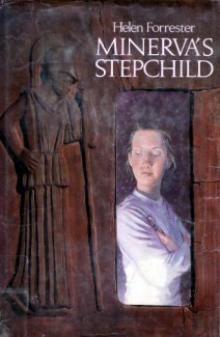 Minerva's Stepchild
Minerva's Stepchild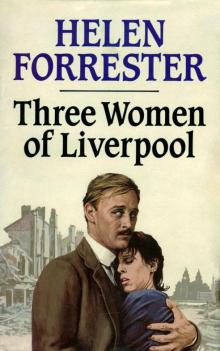 Three Women of Liverpool
Three Women of Liverpool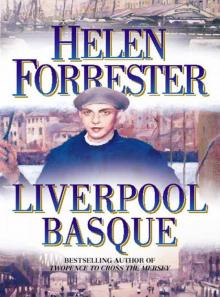 The Liverpool Basque
The Liverpool Basque Liverpool Miss
Liverpool Miss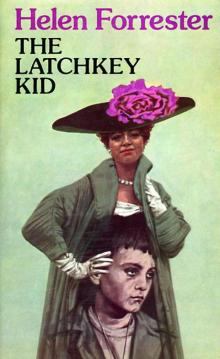 The Latchkey Kid
The Latchkey Kid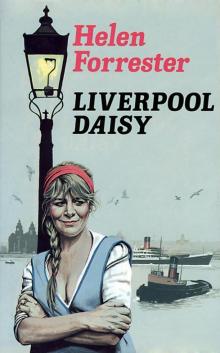 Liverpool Daisy
Liverpool Daisy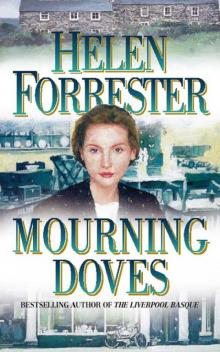 Mourning Doves
Mourning Doves